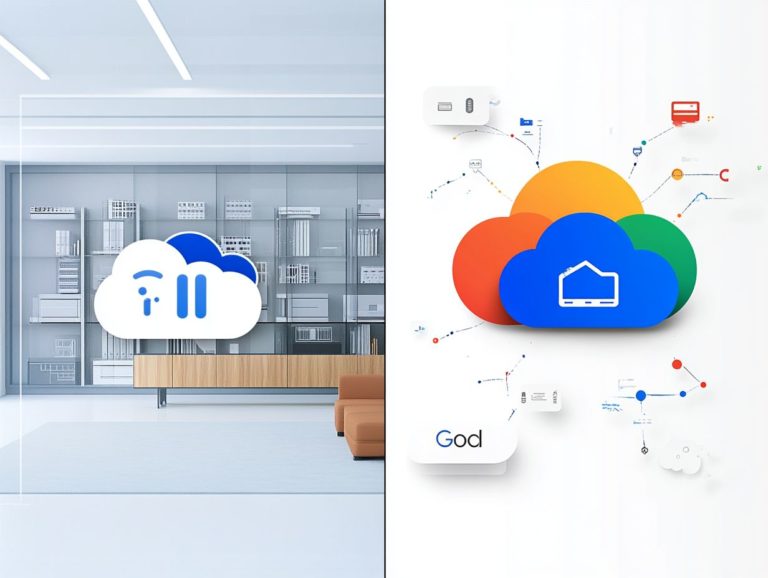The Pros and Cons of Top Cloud Providers
In today s digital landscape, selecting the right cloud provider can profoundly influence your business s efficiency and growth. Let s explore the top players in cloud computing: Amazon Web Services, Microsoft Azure, and Google Cloud Platform!
You ll find a thorough examination of their unique features, advantages, and drawbacks, which will guide you through the complexities of cloud solutions. Crucial considerations such as security, costs, and future trends will also be discussed, equipping you with the knowledge needed to make an informed choice.
Contents
- Key Takeaways:
- 1. Amazon Web Services (AWS)
- 2. Microsoft Azure
- 3. Google Cloud Platform
- 4. IBM Cloud
- 5. Oracle Cloud
- 6. Alibaba Cloud
- 7. Salesforce
- 8. Rackspace
- 9. VMware
- 10. Adobe
- Pros and Cons of Using a Cloud Provider
- What Are the Benefits of Using a Top Cloud Provider?
- What Are the Drawbacks of Using a Top Cloud Provider?
- How Can a Business Choose the Right Cloud Provider for Their Needs?
- What Are the Security Concerns with Using a Cloud Provider?
- What Are the Costs Associated with Using a Top Cloud Provider?
- What Does the Future Hold for Cloud Computing and Top Cloud Providers?
- Frequently Asked Questions
Key Takeaways:

Amazon Web Services, Microsoft Azure, and Google Cloud Platform are the top cloud providers, offering a wide range of services and features. While these providers offer scalability, cost-efficiency, and ease of use, they also have drawbacks such as potential security risks and vendor lock-in. Businesses should carefully assess their needs and compare features, pricing, and security measures when choosing a cloud provider.
1. Amazon Web Services (AWS)
Amazon Web Services (AWS) is a premier leader in cloud computing. It offers a vast array of cloud solutions designed to fit different needs across various industries from enterprise applications to data management.
AWS enables businesses to optimize both infrastructure and operational costs while enhancing employee collaboration and scalability. Notable companies like Netflix, Coca-Cola, and Toyota trust AWS for their cloud needs, demonstrating its versatility and reliability in supporting digital operations.
Take Elastic Compute Cloud (EC2); it provides scalable computing capacity that allows you to adapt seamlessly to shifting demands. Simple Storage Service (S3) ensures secure, scalable storage solutions, essential for managing substantial data volumes.
AWS Lambda allows developers to run code without setting up servers, streamlining operations even further. While many organizations are quickly discovering the unmatched scalability and disaster recovery benefits of AWS, it s important to be aware of challenges. Navigating pricing complexities and maintaining ongoing security vigilance are essential for fully harnessing cloud infrastructure.
2. Microsoft Azure
Microsoft Azure is your go-to cloud computing platform, offering a wide range of services, including infrastructure as a service (IaaS) and platform as a service (PaaS). This allows you to manage both infrastructure maintenance and operational needs effectively.
With advanced analytics and machine learning features, Azure enhances user experience and supports various enterprise applications, making it a top choice for organizations navigating compliance challenges.
This platform helps you leverage predictive analytics and real-time data processing, driving smarter decisions and boosting operational efficiencies. For instance, Starbucks utilizes Azure s machine learning capabilities to enhance customer engagement by analyzing purchasing patterns. Similarly, Unilever uses these tools to optimize their supply chain processes.
Azure s seamless integration with existing enterprise applications simplifies compliance management, ensuring you meet industry regulations while enjoying a user-friendly experience. The rich set of analytics tools available allows you to gain crucial insights for strategic planning and operational improvement.
3. Google Cloud Platform
Google Cloud Platform (GCP) stands out as a versatile cloud computing service, offering a comprehensive suite of tools tailored for data management, cloud integration, and advanced analytics. It’s designed to meet your business’s evolving needs while ensuring compliance with industry regulations.
With its robust infrastructure, GCP minimizes network latency and addresses security concerns. This makes it a compelling choice for various cloud service providers.
When handling large datasets, features like BigQuery enable you to operate with remarkable speed and efficiency. This allows you to extract insights and make data-driven decisions in no time.
The Google Kubernetes Engine simplifies container orchestration, ensuring your applications run seamlessly and can scale effortlessly to adapt to changing demands. Companies like Expedia thrive on GCP’s reliable performance, ensuring they stay ahead in the game.
This platform helps them navigate compliance challenges while boosting operational agility. Similarly, Morefield Communications harnesses GCP’s powerful analytics tools to enhance business intelligence and overall efficiency, proving that GCP can be a game-changer for any organization.
4. IBM Cloud
IBM Cloud stands out as a comprehensive cloud computing solution that masterfully combines services that provide hardware and storage over the internet with cutting-edge cloud applications. This platform enables you to implement automated maintenance and effective disaster recovery strategies tailored to your unique organizational needs, making it an ideal choice for businesses looking to optimize costs.
By integrating advanced AI features, IBM Cloud enables you to analyze vast amounts of data efficiently. This unlocks actionable insights that can drive your decision-making process.
Its hybrid cloud offerings provide the flexibility you need, allowing you to blend on-premises resources with public cloud services. This enhances your scalability and responsiveness.
Consider how businesses in finance and healthcare have harnessed IBM Cloud s robust automation features to make their work easier while safeguarding sensitive information. You, too, can benefit from proactive disaster recovery solutions that ensure minimal downtime and data integrity during unexpected events.
IBM Cloud is known as a trusted partner in today s digital landscape, guiding you through challenges with confidence.
5. Oracle Cloud
Oracle Cloud stands out as a formidable cloud computing platform designed specifically for enterprise applications. It offers integrated cloud storage and database services that enable seamless business operations while addressing crucial compliance issues.
With its unique offerings, you can scale efficiently, significantly enhancing your overall business strategy and digital operations.
Beyond its impressive database solutions, Oracle Cloud boasts advanced business intelligence applications, enabling you to extract actionable insights from your data. By harnessing AI and machine learning within your analytics, you can make more informed decisions that drive innovation.
Security is a top priority. Oracle Cloud meets compliance concerns with robust security protocols and regular updates, providing you with peace of mind as you navigate the regulatory landscape.
These capabilities enhance employee productivity and foster more effective collaboration among teams, allowing everyone to focus on strategic tasks instead of getting mired in cumbersome processes.
6. Alibaba Cloud

Alibaba Cloud has positioned itself as a prominent player in the global cloud computing arena, offering a comprehensive suite of cloud solutions designed to tackle critical infrastructure and operational costs while enhancing digital operations across diverse industries.
With its strategically located edge centers, Alibaba Cloud enables you to optimize user experience and scalability. By providing services like data management and edge computing, it helps your enterprise efficiently handle vast amounts of information while minimizing latency for your end users.
For instance, a leading retail chain in Asia significantly improved its inventory management and customer engagement by leveraging Alibaba Cloud’s analytics tools, which streamlined operations. This capability supports real-time data processing and allows you to scale your resources according to demand, leading to better efficiency and lower costs.
As enterprises across various sectors embrace these innovative solutions, the transformative impact on their workflows becomes increasingly clear.
7. Salesforce
Salesforce stands out as a premier cloud computing platform specializing in customer relationship management (CRM). It elevates employee collaboration and refines your business strategy through exceptional cloud integration capabilities.
With its intuitive interface and scalable solutions, it attracts a diverse range of cloud service providers eager to enhance customer insights. The platform’s robust ecosystem enables seamless connection with third-party applications, enriching functionality and promoting smoother workflows.
By leveraging advanced analytics and AI-driven tools, you ll be equipped to make data-informed decisions that drive your initiatives forward. Salesforce fosters smooth communication across departments, ensuring information flows effortlessly and aligns perfectly with agile methodologies that today s businesses prioritize.
This comprehensive approach enhances customer engagement and amplifies overall organizational efficiency, making Salesforce an essential asset in the ever-evolving digital landscape.
8. Rackspace
Rackspace provides a premium suite of cloud computing services specially designed to handle managed cloud solutions that eliminate the hassles of security concerns and compliance issues, no matter the size of your business. Their commitment to excellence ensures you navigate the cloud technology landscape with confidence.
By focusing on robust security frameworks and top-tier compliance measures, Rackspace s managed services allow you to thrive in the digital era. You can use these tailored solutions to minimize risks related to data breaches and ensure you meet all regulatory requirements.
Companies across various sectors have turned to Rackspace to improve how well things run, and the results speak volumes.
For example, a financial institution managed to trim compliance overhead by an impressive 40% while simultaneously boosting security. Such outcomes highlight the transformative impact Rackspace’s offerings can have on your organization s productivity and peace of mind.
9. VMware
VMware stands out for its cutting-edge cloud computing solutions that harness virtualization to optimize your infrastructure and costs.
If you re looking to boost efficiency and scalability, VMware s software-defined data centers give you the capability to manage resources effectively while enjoying flexibility in cloud deployment.
By embracing VMware’s advanced virtualization technologies, you can significantly reduce capital expenditures and enhance resource utilization throughout your IT environment.
For example, in healthcare, hospitals are streamlining data management processes, enabling quicker access to patient records while keeping expenses under control.
Retail organizations are similarly using these capabilities to refine inventory management and elevate customer experience.
The scalability that VMware offers allows you to adapt effortlessly to shifting demands, integrate smoothly with existing systems, and set the stage for a hybrid cloud strategy catering to various operational needs.
10. Adobe
Adobe has successfully transitioned to cloud computing, offering a suite of cloud solutions that enhance your digital operations and foster seamless collaboration among employees through its creative software services.
This commitment to cloud technology reflects a larger trend as providers adapt to the evolving demands of modern business.
Creative Cloud integrates real-time collaboration tools and effortless file sharing, allowing you and your team to work together more efficiently, regardless of your location.
This flexibility is particularly beneficial for creative professionals who often juggle multiple projects and need to synchronize their processes with colleagues or clients.
Accessing and editing your projects from anywhere ensures that contributions can be swiftly incorporated, resulting in faster turnaround times and elevating the quality of your final products.
Continuous updates and new features provided through cloud solutions keep you and your creative team at the forefront of innovation.
Pros and Cons of Using a Cloud Provider
Using a cloud provider has its advantages and disadvantages. To navigate these complexities, it’s important to consider factors like operational costs, security concerns, and pricing disparities, as highlighted in the top 5 cloud providers for startups.
Cloud service providers offer scalability, flexibility, and improved collaboration. However, there are potential drawbacks to consider, such as data breaches and compliance issues that can significantly influence your overall business strategy.
On one hand, the scalability of cloud services allows you to adjust your resources effortlessly to meet fluctuating demands, often resulting in considerable savings on infrastructure costs.
Robust disaster recovery solutions can protect your critical data, ensuring business continuity even in unexpected disruptions.
However, it s essential to consider the risks of service outages, which can severely impact your operations, along with persistent security vulnerabilities that may compromise sensitive information.
For example, a major retailer faced backlash after a data breach in its cloud services, highlighting the urgent need for strict compliance measures. Yet, companies like Netflix and Dropbox have navigated these challenges successfully by harnessing cloud computing benefits while implementing strong security protocols.
What Are the Benefits of Using a Top Cloud Provider?

Using a top cloud provider offers numerous advantages for you and your organization, including higher employee productivity, scalability, and access to sophisticated analytical tools for informed decision-making.
Cloud computing allows you to leverage on-demand resources while minimizing infrastructure costs, making your business strategy more agile.
By fostering robust collaboration tools, these providers enable your teams to communicate effortlessly, regardless of their location a crucial asset in today s remote work landscape.
Take Airbnb, for instance; they use cloud services to ensure their platform can handle high traffic volumes while delivering real-time data analysis to enhance user experiences.
Similarly, Lyft leverages scalable cloud infrastructure to support its growing operations, increasing efficiency, especially during peak passenger demand.
With superior disaster recovery solutions integrated into these cloud services, you can protect your critical information, ensuring continuity and resilience against unforeseen challenges.
Discover how cloud technology can transform your business today!
What Are the Drawbacks of Using a Top Cloud Provider?
While leading cloud providers present considerable advantages, it’s essential to be aware of notable drawbacks, including security concerns, pricing variances, and the possibility of service outages. These issues can jeopardize operational continuity and impact your cloud strategy’s effectiveness.
Security risks, like data breaches and compliance challenges, are significant concerns for organizations relying on these services. For instance, the severe breaches experienced by Equifax and Capital One highlighted vulnerabilities within cloud infrastructures.
You may navigate a maze of varying pricing models that could lead to unexpected budget overruns. Unpredictable costs and hidden fees can disrupt your financial planning.
Therefore, it s vital to evaluate your cloud strategies meticulously. Weighing these factors ensures that the benefits do not overshadow potential risks.
How Can a Business Choose the Right Cloud Provider for Their Needs?
Choosing the right cloud provider is crucial for meeting unique customer requirements and leveraging the benefits of cloud computing while minimizing potential drawbacks.
As you evaluate options, closely examine scalability, security features, and the commitments a cloud provider makes regarding their service to ensure they align with your business goals.
Furthermore, consider compliance with industry regulations and the financial viability of your chosen cloud partner.
To assess different service providers effectively, start by examining their scalability options. Can they support your growth without compromising performance?
Next, look into their security protocols. Do they provide robust encryption, which is a method of protecting data by converting it into a secure format, and conduct regular security audits?
Compliance is another critical factor. Does the provider adhere to relevant regulations such as GDPR or HIPAA?
Don t forget to analyze financial aspects, including pricing models and total cost of ownership, ensuring the provider fits your budget while delivering real value.
For a well-rounded decision, consider conducting a risk assessment to weigh the pros and cons of various options. Leveraging case studies that showcase successful partnerships in similar industries can also guide your choice.
What Are the Security Concerns with Using a Cloud Provider?
Security concerns take center stage when engaging with a cloud provider. You need to consider potential data breaches, compliance issues, and the overall safety of your operational data in a shared environment.
Understanding these risks is key to protecting your valuable data. As services rapidly migrate to the cloud, the threat landscape expands significantly, leaving your organization exposed to unauthorized access and data leaks.
Compliance challenges arise as regulations differ across industries and regions, creating a complex framework you must navigate carefully. Employing encryption technologies is vital; it ensures your data remains secure both in transit and at rest.
Conducting regular audits helps identify vulnerabilities and verify compliance with applicable standards. Companies like Dropbox and Netflix showcase how proactive security measures protect valuable data and build customer trust.
What Are the Costs Associated with Using a Top Cloud Provider?
Understanding the costs associated with utilizing a top cloud provider is essential for ensuring budget alignment and cost efficiency in your cloud strategy. Pricing differences can significantly impact your infrastructure and operational costs, making it crucial to grasp these expenses for informed decisions.
Different providers may offer various pricing models, from pay-as-you-go systems to monthly subscriptions, often shaped by the specifics of service commitments. For instance, while a higher commitment might deliver enhanced reliability, it also comes with additional costs that should be incorporated into your financial forecasts.
Estimating operational costs involves reviewing historical data, analyzing projected usage, and applying budgetary strategies such as tiered allocation or setting aside reserves for unexpected expenses to align your spending with anticipated needs.
By creating a flexible budget that adjusts according to your cloud consumption, you can manage expenses more effectively and maximize the value you derive from cloud solutions.
What Does the Future Hold for Cloud Computing and Top Cloud Providers?
The future of cloud computing looks incredibly promising, as leading providers continuously innovate. They weave advanced analytics and machine learning into their services, enhancing digital operations for businesses worldwide.
To capitalize on these advancements, stay ahead of emerging trends. A significant focus is on integrating artificial intelligence (AI) the ability of machines to analyze data and automate tasks into cloud solutions, enabling intelligent automation and predictive analytics for strategic decision-making.
The rise of multi-cloud environments allows organizations to leverage various providers. This optimizes costs and performance while minimizing the risk of being locked into one provider.
For those eager to adapt, embracing these trends means investing in skilled personnel. Cultivating a culture of agility and innovation is crucial.
Expect cloud providers to enhance their platforms with robust security features and seamless interoperability. This paves the way for solutions that are efficient and exceptionally effective.
Frequently Asked Questions

What are the top cloud providers?
The top cloud providers include Amazon Web Services (AWS), Microsoft Azure, Google Cloud Platform (GCP), IBM Cloud, Oracle Cloud, and Alibaba Cloud.
What are the pros of using top cloud providers?
The pros include reliable and secure infrastructure. They also offer scalability, cost-effectiveness, and access to various services and tools.
What are the cons of using top cloud providers?
The cons include potential downtime and dependency on internet connectivity. There are also concerns about data privacy and security, along with the possibility of unexpected costs.
Which top cloud provider offers the best security?
All top cloud providers implement robust security measures. However, AWS is often viewed as having the most comprehensive features and certifications.
What factors should I consider when choosing a top cloud provider?
Consider your business’s specific needs. Check pricing, support, reliability, ease of use, and the level of control and customization offered by each provider.
Is it possible to use multiple top cloud providers?
Yes, using multiple providers is a viable option, known as a multi-cloud strategy. This offers flexibility and redundancy, but brings complexity in integration and management.





